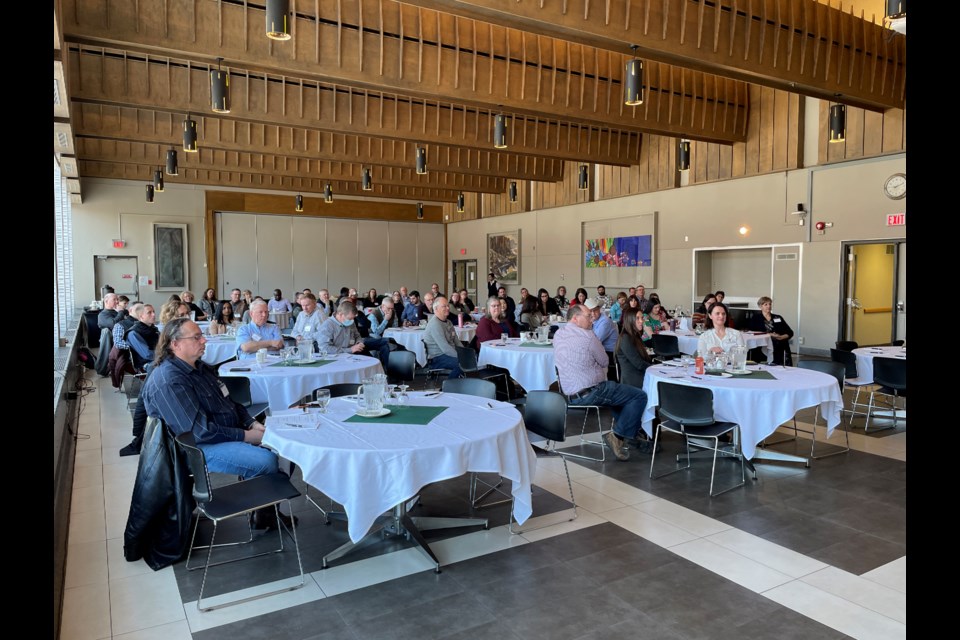SASKATOON — Livestock and forage scientists at the University of Saskatchewan seeking to refine their research met with producers and industry leaders at the sixth annual Beef and Forage Research Forum.
“The reason I’m doing research is for the producers. This forum is a great avenue to get some feedback from them,” said Dr. Bree Kelln (PhD), Beef Industry Research Chair in Integrated Forum Management and Utilization and assistant professor at the College of Agriculture and Bioresources.
About 70 people attended the forum at Marquis Hall on the USask campus in Saskatoon on March 2, 2023. USask’s College of Agriculture and Bioresources and Livestock and Forage Centre of Excellence, the Saskatchewan Cattlemen’s Association and the Government of Saskatchewan sponsored the forum. Because of COVID-19 restrictions, the forums in 2021 and 2022 were virtual events.
Kelln, early in her career as a researcher, found meeting people face-to-face invaluable. In her presentation to the group, she explained her interdisciplinary research that will involve the soil, plants, animals, the environment and economics. In addition to feedback after her presentation, she had several conversations during breaks with producers and those involved in deciding how research funding is awarded.
“I was able to explain the ‘why’ behind my research so when I submit applications for funding, mine isn’t just another piece of paper. And they gave good feedback and made suggestions for ways to add to my research projects,” she said.
Some of the research conducted by Kelln and others who presented at the forum will take place at the Livestock and Forage Centre of Excellence.
Cattle producer Chad Ross, vice-chair of the Saskatchewan Cattlemen’s Association board of directors, is the province’s representative on the Canadian Beef Check-Off Agency. The agency collects a mandatory levy on cattle sales that is invested in research and marketing.
“I like what I see as a producer. We are using our research dollars effectively. We have less duplication of research with the collaboration between Beef Cattle Research Council, the provincial government, the Saskatchewan Cattlemen’s Association and the researchers,” said Ross.
Forum organizers invited researchers studying a wide range of issues including feed and forage, genomics and innovative technologies, and animal nutrition and health to present current and potential research.
Ross saw the value of talking with researchers about their ideas before they start their specific projects.
“It’s very important for researchers and producers to rub shoulders. We can add value to their work because of our experience,” he said.
Learning went both ways with Ross learning from the scientists. He was particularly interested in the research ideas for addressing antimicrobial resistance presented by Dr. Emily Snyder (DVM, PhD) and Dr. Tony Ruzzini (PhD), assistant professors at the Western College of Veterinary Medicine.
“I’m sure I have a problem with antimicrobial resistance but I didn’t understand the science behind it. What we are seeing with our own calves in our own feedlot, I’m sure we are seeing some resistance but I didn’t realize how big the problem is across the industry. It’s scary,” said Ross.
One of the most important sources of research funding is the provincial government through the Agriculture Development Fund (ADF). While presenting research ideas at the forum doesn’t influence decisions made by the committee members, some of those involved in making those decisions also attended the forum.
In her presentation, Barb Ziesman, director of the research unit in the Agriculture Research Branch at the Ministry of Agriculture, explained the process for applying for funding and shared the ADF desired outcomes.
After researchers presented their ideas, fifteen minutes were set aside for roundtable discussions.
“Hearing the producers’ perspective during the roundtable discussions on the research ideas was helpful. When we examine and review the applications, we can reflect on the value of the research to producers,” said Ziesman.
Ziesman and the others agree that being in the same room at the same time and hearing the same information is an efficient and effective way to work together. One of the objectives of the forum is to provide a place where scientists and producers can build relationships and increase understanding that will result in moving beef and forage research beyond the university to cattle operations in the province.

